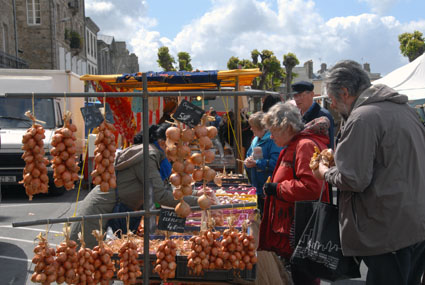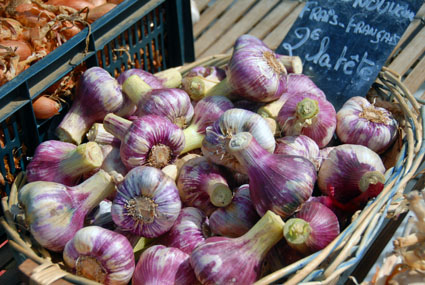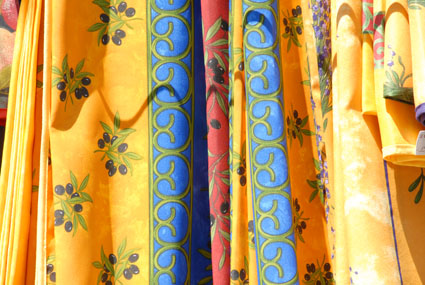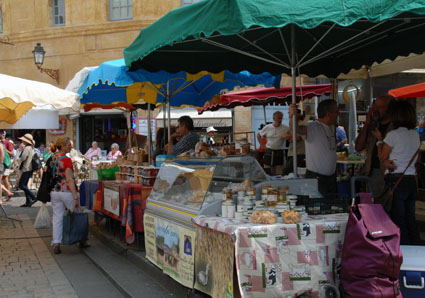FRENCH MARKETS
One of the great pleasures of visiting France is to arrive in a town or village and discover that it is market day. It is a curious fascination, hinged, largely on curiosity – to see how French markets compare with those back home.
Well, there’s no harm in that. The market– ‘le marché’– is an integral part of the French way of life and a key component of the country’s rich historic heritage, but don’t draw too much attention to that; they’ll want to get World Heritage status for them.

There’s something a little compelling, not to mention bizarre, about the way we wander the stalls, breathing in the aromas of cheeses, herbs, fresh bread, roasting chickens and huge dishes of steaming paella or cassoulet or something else equally stomach-destined that blend together atmospherically much as the notes of a Debussy prelude might. In fact, that’s what it’s all about – the stomach, not Debussy – because markets have long been the principal source of fresh fruit and vegetables for households large and small, an integral part of France’s tradition of eating well, and a deep-rooted institution that never died...and that’s about as authentic as you can get in France.
Most towns and villages have a market once a week, but in larger towns, they may take place twice a week, or even every day. I doubt that anyone knows just how many markets there are, but the excellent website – www.jours-de-marche.fr – lists more than 7,500, and admits to there being a great many more.

Typically, French markets are a cross between a farmers’ market and a traders’ market, with stalls offering local produce straight from the farm alongside fruit and vegetable stalls, cheese stalls and others offering a full range of edible produce. Even in Paris, fruit and vegetable markets can be found in every district of the city. But many of the larger markets also deal in clothing and jewellery, and that’s where I leave my wife to it, and go and have a coffee...there’s a limit to how much bling I can cope with, although I do confess to more than a passing interest in local and regional wines, cheeses, fresh meat and kitchenware. But just as I’m about to shell out for an essential chef’s knife my wife appears and reminds me that I already have over 100 at home. And so we buy cheese instead, or some olives. Just as well she wasn’t around when I bought the Laguiole steak knives, but, in my own defence, they are so clinically sharp we can now opt for a cheaper cut of meat.
Actually, I lied about the number of knives I have...it’s more than that! Well, I mean, you can’t use the same knife to slice a lemon as you would for an orange, can you?

Many of the street markets are attended by full-time stallholders, who travel around the neighbourhood markets day-by-day. If it wasn’t for these itinerant stallholders, many villages would struggle to get fresh produce. Larger weekly markets, such as the wacky Tuesday market in Vaison-la-Romaine in Provence, have a rich range of specialised stalls selling organic vegetables, food specialities from the region or from other countries, olives and Mediterranean specialities, tools, clothes, second-hand books, garden plants, wine straight from the producer, honey and a lot more: the spice stall alone is over 20 metres in length.

A few specialised markets have a national reputation, such as the famous flea market at the Porte de Clignancourt in Paris, the flower market in Nice, the Christmas market in Strasbourg, the olive markets in Provence, or the fish market round the old port in Marseille. There are wine markets in Bordeaux, and gastronomic markets in Perigueux, the heart of French truffle and foie gras country. But generally speaking, markets are just a vital part of the French way of living.
In rural areas, farmers and locals with a patch of soil to till come to market to sell just their own surplus produce: potatoes, vegetables and fruit in season, flowers, home-made cheese and bread, fresh eggs, and even a living rabbit or two, or week-old chicks.
Yet in spite of France’s attachment to its rural heritages, the smallholders selling their produce at a weekly market represent a rural way of life that is slowly vanishing. It is unusual to see young smallholders on a market in rural France, and while the market itself, as a tradition, is not under threat, the nature of small rural markets is changing, as is rural France in general.
There will always be markets in France, and they will continue to be a fascination. In a roundabout way, it is the ability to make the most of a rural street market that prompts me to use self-catering accommodation when I visit for any length of time...that and the chance to slip out and buy a new knife...an essential one, of course.
SEARCH THIS WEBSITE

Recent Articles
-
Eiffel Tower Facts And Eiffel Tower Information If You Visit Paris
Apr 28, 19 01:12 PM
20 amazing Eiffel Tower facts and alll the essential Eiffel Tower information you need if you're planning to visit this astonishing Paris landmark.
-
Free WiFi in Paris - How to Access Free Internet in Paris France
Apr 22, 19 05:28 AM
Paris WiFi is a free internet service offered by the Ville de Paris. On this page we'll explain how to access free wifi in Paris and free WIFI in France
-
Boating in France Enjoy French Canal Holidays or Hire a Boat in France
Apr 19, 19 02:25 PM
Experience the natural beauty of rural France from its waterways. Boating in France and enjoying French canal holidays offers the ultimate in relaxation.


